Dec 4, 2023
English: "Ed" endings on words
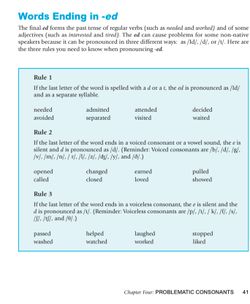
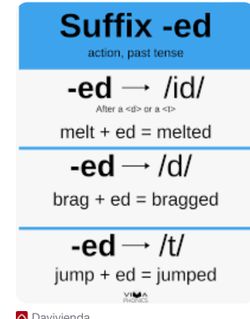
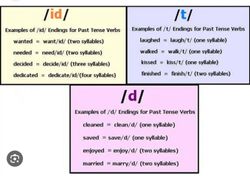
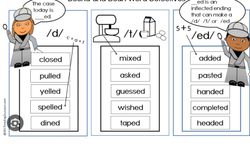
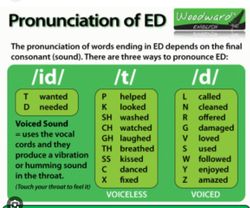
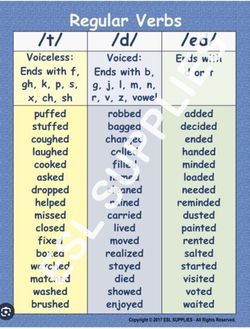
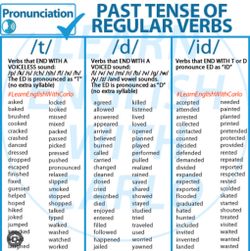
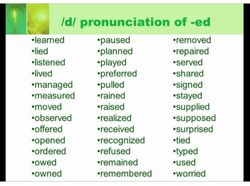
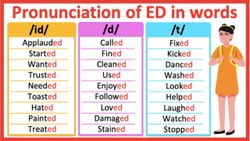
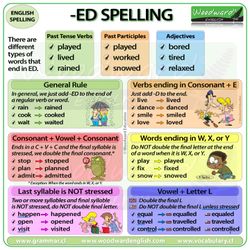
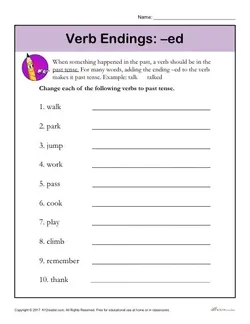
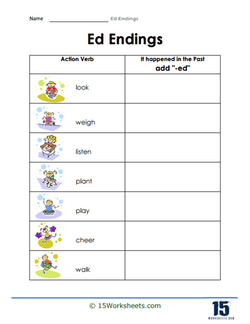
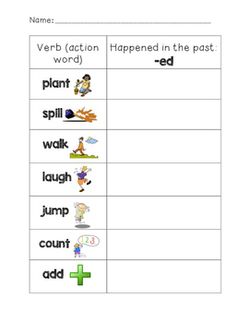
1. How to Pronounce 'ed' Endings:
3 Very Easy Rules
Rule one, if the sound at the end of the infinitive is unvoiced, ED is pronounced tt– walked.
Rule two, if it’s voiced, the ED is pronounced dd– agreed. Seemed.
Rule three, if that last sound is T or D, the ED ending is –ihd: needed, painted.
The /id/ sound
If the last letter of the word is spelled with D or T, the ED is pronounced as a separate syllable with an /id/ sound (it rhymes with kid and lid).
wanted (sounds like "want-id")
waited
needed
folded
The /t/ sound
If the last consonant of the word is voiceless, then the ED is pronounced as a T. Be careful not to create an extra syllable or "id" sound.
talked (sounds like "talkt")
kissed (the S sound comes from the front of mouth so it
would sound like "kisst")
parked
helped
NOTE: As an example, with the word "helped", if you say "help-id" as a two syllable word, then it is very likely that people will NOT understand the word or what you are saying. (It is pronounced like "helpt")
The /d/ sound
If the last letter of the words ends in a voiced consonant (or sound), then the ED is pronounced like a D (without creating another syllable)
played (sounds like "playd")
closed (the S sounds like a vibrating Z so the word would
sound like "clozd")
opened
lived
2. An easy way to remember how to pronounce ED words
The most important thing to remember is that there are two main divisions:
The words that end in T or D
- the ED is pronounced as a syllable /id/
and the REST of the words
- you can pronounce the ED as /t/ and people will understand.
In time you will learn when to pronounce the ED as /t/ or /d/.
The following is a guide to the correct spelling of words ending -ED.
Remember: Not all words that end in -ED are verbs in the past tense. Sometimes they are Past Participles or they could even be Adjectives ending in -ED. For now we will mostly use verbs in the Past Tense as examples though the same rules apply to all words ending in -ED
The general rule when changing a word (or verb) into its -ED form is just to add -ED to the end of it.
Infinitive ED form
to play played
to wait waited
to work worked
to rain rained
He played with his dog in the backyard.
I waited for them to invite me.
She worked until late last night.
It rained all day.
Spelling Exceptions
The following exceptions exist when spelling words ending in ED:
3. ). If a word ends in an E we just add the D to the end.
Infinitive ED form
to live lived
to love loved
to smile smiled
to dance danced
I lived in Japan for two years and then moved to Thailand.
I loved the surprise you had for me.
He smiled when he saw his wife come through the door.
They danced until their feet hurt.
4). If the word ends in a Consonant + Vowel + Consonant, we double the final consonant and add ED.
Infinitive ED form
to stop stopped
to admit admitted
to plan planned
to refer referred
to commit committed
The policeman stopped the thief from escaping.
He admitted that he was wrong.
We planned a surprise birthday party for our friend.
I referred the students to the website where they could practice some more.
They committed a serious crime and will end up in jail.
5. ). If a two-syllable verb ends in a Consonant + Vowel + Consonant, we DO NOT double the final consonant when the stress is on the FIRST syllable.
Infinitive ED form
to happen happened
to enter entered
to offer offered
to suffer suffered
What happened?
I entered through the back door.
She was offered a new position with a higher salary.
Many people are suffered from a lack of food and water
.
6.. BUT, we DO NOT double the final consonant when the word ends in W, X or Y or when the final syllable is not stressed.
Infinitive ED form
to fix fixed
to enjoy enjoyed
to snow snowed
He fixed his bike.
We enjoyed our time in the North of Chile.
It snowed yesterday.
7. If the verb ends in consonant + vowel + L, we normally double the final L and add ED.
Note: In the United States (US) they DO NOT double the L when the accent is on the first syllable.
Infinitive ED form
to travel travelled /traveled
to marvel marvelled marveled
I traveled around South America in 2012.
Her beauty marveled us.
Verbs ending in “ed” and “ing”
Write each verb in their “ed” and “ing” form.
1. talk __________ __________
2. park __________ __________
3. finish __________ __________
4. jump __________ __________
5. rock __________ __________
6. look __________ __________
7. climb __________ __________
8. brush __________ __________
9. toss __________ __________
10. fish __________ __________
Write each verb in their –ed and –ing form.
1. tan __________ __________
2. wag __________ __________
3. dot __________ __________
4. slap __________ __________
5. fit __________ __________
6. drip __________ __________
7. whip __________ __________
8. flip __________ __________
9. fan __________ __________
10. tip __________ __________
Hint:
pin, pinned, pinning
1. Added
2. Aided
3. Aimed
4. Aired
5. Aloud
6. Armed
7. Asked
1. Led Red Bed Fed Wed
Used Need Feed Aged Seed
2. Shed Read Fled Bred Lied
Heed Sped Dyed Iced Tied
3. Speed Urged Embed Ached Tired
Dried Flied Wired Baked Piled
4. Sided Faked Greed Muted Edged
Raced Diced Coded Caged Faded
5. Poised Indeed Closed Sacred Polled
Boiled Elated Forced Minded Misled
6. Linked Rugged Packed Headed Voiced
Wedged Exceed Varied Loaded Landed
7. Limited Alleged Smashed Related Guarded
Hundred Applied Painted Hurried Unarmed
8. Married Removed Crowded Deleted Exalted
Engaged Rounded Cramped Seaweed Divided
9. Spotted Tangled Beloved Retired Studied
Unaided Unmoved Cramped Favoured Coloured
10. Provided Unwanted Adjusted Included Impacted
Advanced Isolated Composed Assorted Acquired
11. Extended Confused Educated Travelled Inclined
Attached Indebted Inflated Featured Elevated
12. Developed Concerned Saturated Simulated Qualified
Collected Delighted Confirmed Laminated Satisfied
13. Unlimited Practised Flavoured Unaltered Unchecked
Disturbed Civilised Submerged Dignified Contented
14. Considered Unexplored Unrealised Unexpected Unfinished
Celebrated Challenged Calculated Structured Restricted
15. Pronounced Undefeated Redefined Privileged Unemployed
Unaccustomed Confounded Farsighted Unscripted Evenhanded
16. Experienced Dilapidated Generalised Complicated Conditioned
Opinionated Preoccupied Unspecified Uninhibited Unorganised
17. Incorporated Acknowledged Accomplished Computerised Unparalleled
Dissatisfied Impoverished Multifaceted Malnourished Discontented
18. Coldhearted Disconnected Multilayered Encapsulated Shortsighted
Sophisticated Unprecedented Unanticipated Overqualified Indisciplined
19. Disadvantaged Unarticulated Countersigned Disillusioned Reestablished
Aforementioned Unacknowledged Underpopulated Overprivileged Revolutionised
20. Interconnected Conceptualised Uncontradicted Hyperpolarized Structuralised
Underprivileged Circumnavigated Intercorrelated Counterweighted Traditionalised
Overexaggerated Hyperventilated Noncomputerised Counterbalanced Sensationalised
By undefined
19 notes ・ 52 views
English
Elementary